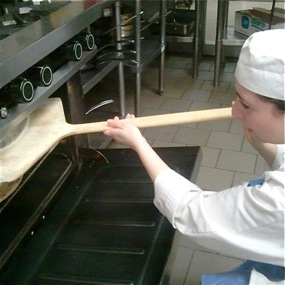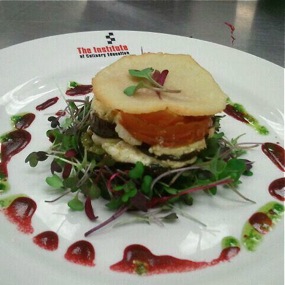 My name is Alison, and I am a Jewish day-school grad from Columbus, Ohio…enrolled in a non-kosher culinary school. I did this because I want to learn EVERYTHING about food! Crabs, lobsters, pork, shellfish, shrimp and all other forms of treif as well as non-treif. I want to touch it, cook it and experience it. Even if we cook something from kosher ingredients, it is always in non-kosher pots and pans and therefore forbidden for me to eat.
My name is Alison, and I am a Jewish day-school grad from Columbus, Ohio…enrolled in a non-kosher culinary school. I did this because I want to learn EVERYTHING about food! Crabs, lobsters, pork, shellfish, shrimp and all other forms of treif as well as non-treif. I want to touch it, cook it and experience it. Even if we cook something from kosher ingredients, it is always in non-kosher pots and pans and therefore forbidden for me to eat.
My rabbi told me I could taste my assignments as long as I don’t swallow anything, but I can’t get the full flavor unless it hits every taste bud on my tongue – not the easiest thing to do. I pretty much avoid tasting and, instead, practice with kosher versions of the food at home.
So why am I putting myself through this? Why don’t I just go to CKCA or the Jerusalem Culinary Institute, both kosher culinary institutions?
Since I was a child, I wanted to go to culinary school, and I promised myself that WHEN I went, I was going to experience everything, within the confines of halacha. I wanted to increase my knowledge of all aspects of the kitchen.
 I can’t eat anything in class, and that’s not fun (especially when it goes from 6pm to 10pm without break), but that’s life as an observant Jew, and my goals are worth the sacrifice. Before Orthodox Jews go into the secular world, they need to be strong in what they believe and have a good grasp of the halachot pertaining to what they are doing.
I can’t eat anything in class, and that’s not fun (especially when it goes from 6pm to 10pm without break), but that’s life as an observant Jew, and my goals are worth the sacrifice. Before Orthodox Jews go into the secular world, they need to be strong in what they believe and have a good grasp of the halachot pertaining to what they are doing.
The payoff? The things I have learned and cooked with, thus far, are amazing; I am now getting up close and personal with foods I never thought I would touch or even see without being behind a television screen or display case.
My goal is to use what I learn to make kosher food as expansive as possible, in appearance and taste. So here are the top ten things I’ve learned, as they relate to the kosher homemaker:
1. Read recipes. Before you begin a trip, you have to know where you are going. Are you able to ride a bike there? Do you need to drive a car? The last thing you want to do is start your journey and realize that you don’t have the tools to get to your destination! Read your recipes thoroughly and think about all the steps in the recipe. Do they make sense to you? Maybe you need to adjust the ingredients and skip or add a technique. Plan ahead and you won’t make a wrong turn!
2. Use a good knife. Ever cut into a pineapple or onion with a dull knife? Not only does it come out uneven and take forever, it also leaves your kitchen a mess. If you slice onions with a sharp knife, the sulfur doesn’t break as much, causing you to tear less!
 3. Use salt. Have you ever heard someone say, “No one makes this like my mom!” The difference between a home cook and a restaurant is often salt content. If high blood pressure doesn’t run in your family, your mother probably seasoned her food with salt. So don’t be afraid, a little salt goes a long way!
3. Use salt. Have you ever heard someone say, “No one makes this like my mom!” The difference between a home cook and a restaurant is often salt content. If high blood pressure doesn’t run in your family, your mother probably seasoned her food with salt. So don’t be afraid, a little salt goes a long way!
4. Pre-heat your pan. Food you cook sticks to your pans? Don’t give up! This is one of the most common mistakes in cooking. To prevent sticking and ensure a nice golden color on your fish, meat, chicken or tofu, make sure the oil in your pan is sizzling. To test, sprinkle a few drops of water in the pan; if it pops, you can start sautéing or searing. But be careful! Too much water can lead to oil popping in your face.
5. Experiment! You never know what new trendy dish you will come up with. Don’t get down if you mess up; it happens to everyone. Just keep on cooking and you are bound to come up with something tasty! This is just one way to have fun in the kitchen, and experimenting with food is how the best recipes are invented!
 6. Who says you can’t have it all? Don’t let allergies, dislikes or Pesach keep you from enjoying what you love or want to try. A lot of food items can be replaced or replicated. Eggs, milk, wheat…you name it, there’s always a substitution.
6. Who says you can’t have it all? Don’t let allergies, dislikes or Pesach keep you from enjoying what you love or want to try. A lot of food items can be replaced or replicated. Eggs, milk, wheat…you name it, there’s always a substitution.
7. You get what you pay for. So buy the best produce you can. If you pay for old tomatoes, you get an old tasting tomato salad. The fresher the better! This doesn’t mean throw old produce out. Fruits and tomatoes can be made into sauces, and herbs can be made into flavorful herb oils to put on top of roasted vegetables or salad. Aging vegetables make a wonderful vegetable soup!
8. Cook’s best friends. Immersion blenders and food processors provide great shortcuts and make a huge difference for home cooks and chefs. Have you ever grated your potatoes and onions by hand for a meal of 20? Unless you enjoy grating the potatoes and tearing from the onions, I recommend investing in a food processor. Even the cheapest one will get the job done more efficiently.
 9. Kitchen safety. Know what to do in situations that could arise. An automatic reaction to a fire is dousing it with water, but you should never put water on a grease fire (remember tip #4)! Keep band aids in your kitchen for minor cuts and burns. Don’t let potential hazards in the kitchen stop you from cooking. Everything you do in life has its hazards, but being aware of these issues prevents them from happening in the future.
9. Kitchen safety. Know what to do in situations that could arise. An automatic reaction to a fire is dousing it with water, but you should never put water on a grease fire (remember tip #4)! Keep band aids in your kitchen for minor cuts and burns. Don’t let potential hazards in the kitchen stop you from cooking. Everything you do in life has its hazards, but being aware of these issues prevents them from happening in the future.
10. Reduce sauces. If you have leftover juice in your pan from searing or baking marinated meats, put it on the stove and reduce the juice to a delectable sauce. There is a lot of flavor in the sauce and reducing it to a gravy consistency gives the dish an added dimension that will make your guests wonder why you don’t work in a restaurant.
This article originally appeared on www.cookkosher.com.
Alison Barnett is currently enrolled part-time in the Institute of Culinary Education (ICE) in New York City and works full time for Synagogue Services at the Orthodox Union. She is one of the only observant Jews in this non-kosher culinary program and wants to demonstrate that an observant Jew can do what he or she is passionate about within the realms of Jewish law. Alison started her blog www.alibabka.com in July 2011 to express her passion for cooking and show others that anyone can cook with a little direction, the right tools and patience.
Alison is originally from Columbus, OH and currently resides in New York City.
The words of this author reflect his/her own opinions and do not necessarily represent the official position of the Orthodox Union.



